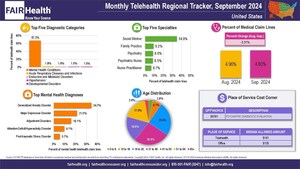National Average Charge for a Complex Hospital Stay for COVID-19 Is $317,810, FAIR Health Finds
Average Estimated Allowed Amount Is $98,139
NEW YORK, Sept. 21, 2021 /PRNewswire/ -- The average billed charge for a complex COVID-19 hospitalization in the United States is $317,810, according to new cost estimates from FAIR Health. The average estimated allowed amount (the total amount paid to an in-network provider, including payments from both the plan and the patient) is $98,139. This cost information can be found in the latest release of FH® Total Treatment Cost benchmarks for COVID-19. Next month, similar values at the state level will be available through a free COVID-19 cost tracker on fairhealth.org.
Launched in November 2020, FH Total Treatment Cost COVID-19 benchmarks provide cost estimates for beginning-to-end treatment pathways for COVID-19, illuminating typical total costs for diagnosis and for professional and facility services associated with treating the disease. The product includes estimates of typical costs for three different designations of severity of COVID-19 care: hospitalization with complexities (such as intensive care unit [ICU] or ventilator), general hospitalization and non-hospitalization. For each, the median and average charge amount and estimated allowed (in-network) amount are given.1
The chart below provides the latest national numbers on estimated costs for COVID-19, updated in FH Total Treatment Cost in September 2021:
Median Charge |
Average Charge |
Median Estimated |
Average Estimated |
|
COVID-19 |
$208,136 |
$317,810 |
$70,098 |
$98,139 |
General |
$54,262 |
$74,591 |
$25,188 |
$33,525 |
COVID-19 Non- |
$2,289 |
$2,557 |
$893 |
$1,008 |
SOURCE: FH® Total Treatment Cost, September 2021 |
Though not depicted here, the COVID-19 cost benchmarks—based on a current, 12-month window of claims, refreshed twice yearly—are organized into mean, 50th and 80th percentiles and grouped into 493 geozips—geographic areas generally based on the first three digits of a zip code—allowing national and local comparisons. The data come from FAIR Health's immense database, the largest repository of private healthcare claims in the nation.
COVID-19 hospitalization with complexities includes, but is not limited to, hospital inpatient services such as laboratory tests, durable medical equipment (such as ventilators), blood and blood components, treatments and specialty drugs, radiology and ICU room and board, as well as outpatient and provider services such as follow-up office visits, lab tests, radiology services, echocardiography procedures, immunology procedures and transfusions. The second category, general COVID-19 hospitalization, includes, but is not limited to, hospital inpatient services such as lab tests, radiology, room and board, treatments and specialty drugs, as well as outpatient and provider services such as follow-up office visits, lab tests, immunology procedures, radiology services, echocardiography procedures, and oxygen and respiratory equipment. Lastly, the COVID-19 non-hospitalization category includes labs, radiology, office visits and cardiography procedures.
Separately, in October, FAIR Health will launch a free COVID-19 cost tracker on its website using data from FH Total Treatment Cost. Interactive maps of the United States will allow users to view state-level cost estimates for the three categories described above: hospitalization with complexities, general hospitalization and non-hospitalization. Users can browse and compare the median and average charge amounts and estimated allowed amounts for the bundled services by state. This tool will be released as a public service for stakeholders in order to provide valuable insights into healthcare spending.
FAIR Health President Robin Gelburd stated: "FAIR Health strives to make its data relevant and actionable, in this case with up-to-date information on the total costs of care for patients diagnosed with COVID-19. We are excited to soon share a more detailed version of this information as a free resource on our website in the hope that it will be useful to the public as the pandemic further evolves."
For more information on the FH Total Treatment Cost COVID-19 benchmarks, contact FAIR Health by email at [email protected].
Follow us on Twitter @FAIRHealth
About FAIR Health
FAIR Health is a national, independent nonprofit organization that qualifies as a public charity under section 501(c)(3) of the federal tax code. It is dedicated to bringing transparency to healthcare costs and health insurance information through data products, consumer resources and health systems research support. FAIR Health possesses the nation's largest collection of private healthcare claims data, which includes over 35 billion claim records and is growing at a rate of over 2 billion claim records a year. FAIR Health licenses its privately billed data and data products—including benchmark modules, data visualizations, custom analytics and market indices—to commercial insurers and self-insurers, employers, providers, hospitals and healthcare systems, government agencies, researchers and others. Certified by the Centers for Medicare & Medicaid Services (CMS) as a national Qualified Entity, FAIR Health also receives data representing the experience of all individuals enrolled in traditional Medicare Parts A, B and D; FAIR Health includes among the private claims data in its database, data on Medicare Advantage enrollees. FAIR Health can produce insightful analytic reports and data products based on combined Medicare and commercial claims data for government, providers, payors and other authorized users. FAIR Health's systems for processing and storing protected health information have earned HITRUST CSF certification and achieved AICPA SOC 2 compliance by meeting the rigorous data security requirements of these standards. As a testament to the reliability and objectivity of FAIR Health data, the data have been incorporated in statutes and regulations around the country and designated as the official, neutral data source for a variety of state health programs, including workers' compensation and personal injury protection (PIP) programs. FAIR Health data serve as an official reference point in support of certain state balance billing laws that protect consumers against bills for surprise out-of-network and emergency services. FAIR Health also uses its database to power a free consumer website available in English and Spanish, which enables consumers to estimate and plan for their healthcare expenditures and offers a rich educational platform on health insurance. An English/Spanish mobile app offers the same educational platform in a concise format and links to the cost estimation tools. The website has been honored by the White House Summit on Smart Disclosure, the Agency for Healthcare Research and Quality (AHRQ), URAC, the eHealthcare Leadership Awards, appPicker, Employee Benefit News and Kiplinger's Personal Finance. FAIR Health also is named a top resource for patients in Dr. Marty Makary's book The Price We Pay: What Broke American Health Care—and How to Fix It and Dr. Elisabeth Rosenthal's book An American Sickness: How Healthcare Became Big Business and How You Can Take It Back. For more information on FAIR Health, visit fairhealth.org.
Contact:
Rachel Kent
Director of Marketing, Outreach and Communications
FAIR Health
646-396-0795
[email protected]
1 A charge amount is the provider's billed, undiscounted fee, which a patient may have to pay when the patient is uninsured, or when the patient chooses to go to a provider who does not belong to the patient's plan's network. An allowed amount (which FAIR Health estimates) is the total fee paid to the provider under an insurance plan. It includes the amount that the health plan pays and the part the patient pays under the plan's in-network cost-sharing provisions (e.g., copay or coinsurance if the patient has met the deductible).
SOURCE FAIR Health

Related Links
WANT YOUR COMPANY'S NEWS FEATURED ON PRNEWSWIRE.COM?
Newsrooms &
Influencers
Digital Media
Outlets
Journalists
Opted In






Share this article